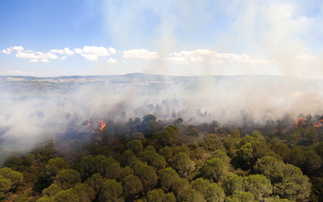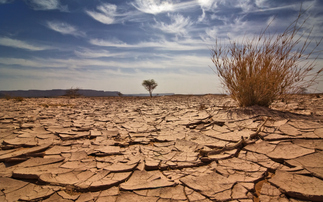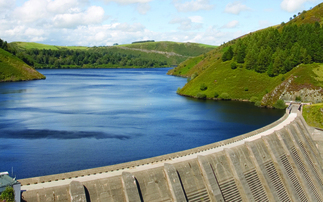Climate risk should be assessed in the same way as risk of nuclear war or pandemic, says new report
When assessing the risk of serious climate change there is not enough focus on the worst-case scenarios that could trigger societal and economic collapse. That's the conclusion of a major new report assessing the risks posed climate change, commissioned by the UK Foreign Office.
Climate Change: A Risk Assessment argues climate risk should be assessed in the same way as risks to national security or public health - considering the worst-case scenario first, and working backwards to avoid that risk coming to pass.
For example, when assessing the risk of a global pandemic scientists and politicians assess the risk of a worst-case scenario and plan accordingly. Similarly, planning for nuclear conflict has long started by addressing the risk of the worst case scenario. Conversely, most assessments of the impact of climate change tend to focus on the impact of two-, three- or four-degree rises in global temperature - when the worst-case long term scenario is closer to a nine or 10-degree rise.
In a foreword to the report, Baroness Joyce Anelay, minister of state at the Commonwealth and Foreign Office, argues climate risk should be assessed in the same way as nuclear war. "When we think about keeping our country safe, we always consider the worst case scenarios," she says in the report. "That is what guides our policies on nuclear non-proliferation, counter-terrorism, and conflict prevention. We have to think about climate change the same way."
The independent report was led by the UK's climate envoy and former chief scientific advisor Sir David King, alongside a team of climate experts from the US, UK, China and India. It adopts the techniques used by national security advisors and commercial experts in risk assessment to help politicians make decisions about how much resource to commit to tackling climate change.
It concludes that without more action from politicians and greater investment in technological innovation, the world is on a pathway to a "medium to high" emissions scenario over the next few decades - the same conclusion as reached by the International Energy Agency in its latest report.
According to the report, this pathway is likely to lead to a global temperature rise of more than four degrees by 2150. It paints a bleak picture of the impact of this level of climate change, identifying thresholds beyond which "the inconvenient may become intolerable".
For example, crops have a limited tolerance for high temperatures. The likelihood of crop failure becomes increasingly significant with global temperature rise of more than two degrees. With a global temperature increase of four to five degrees, the risk of a dramatically reduced rice yield each year hits 75 per cent - a scenario that could lead to frequent shortages, price spikes, political disruption, and social unrest.
Meanwhile, even a small increase in sea level can cause a large increase in the risk of flooding. A global sea level rise of just one metre - the most we are likely to see this century, according to King - turns what would have been a one-in-a-hundred year flood in New York into a twice-yearly catastrophe for the city.
"For a political leader this is a very important piece of information," King said at the report's launch yesterday, adding that he hopes such scenario models would help policymakers fully understand the true scale of climate-related risks.
"There's nothing new about the science in this study, but when we present it in this way it should be clear to any political leader that if global temperatures rise by a few degrees, then the chances of something terrible happening becomes very significant," he said.
This view is shared by members of the environmental community, who welcomed the report's approach to assessing climate risks. Nick Mabey, chief executive of think tank E3G, said the report arrives at a "crucial time", arguing all countries need to "better understand the consequences for their national security and prosperity of failing to meet the two-degrees goal" ahead of this year's Paris Summit.
The report also calls for an "acceleration" of funding into clean tech and energy systems - including wind and solar with storage, nuclear, biofuel, carbon storage, large-scale energy efficiency and zero emissions transport. Without this, it concludes the likelihood of delivering decarbonisation by the end of the century and minimising the risk of worst case scenarios coming to pass is "very low".
King said he hoped the report would spur governments to greater action at the upcoming climate summit in Paris later this year. "We would like this report to have as much impact as possible in the run-up to Paris," he said, adding that copies would be circulated to UN delegates through climate attaches and ambassadors.
Similarly, Anelay said governments must "act with urgency" at the upcoming COP21 summit in Paris to ensure a strong agreement. Also speaking at the report's launch, she urged politicians to think beyond their elected time frame of five to 10 years and take long-term decisions to address the threat of climate change.
"A stronger shared assessment of the risks will support our efforts towards a stronger shared global response," she said. We will have to wait until December to see if she will be proved right.









